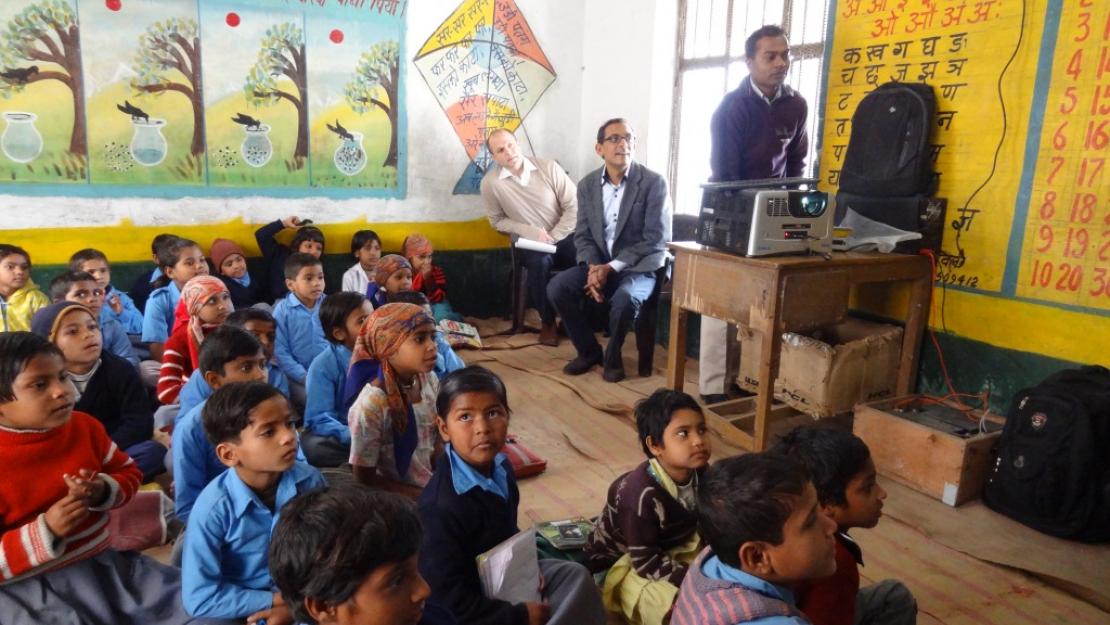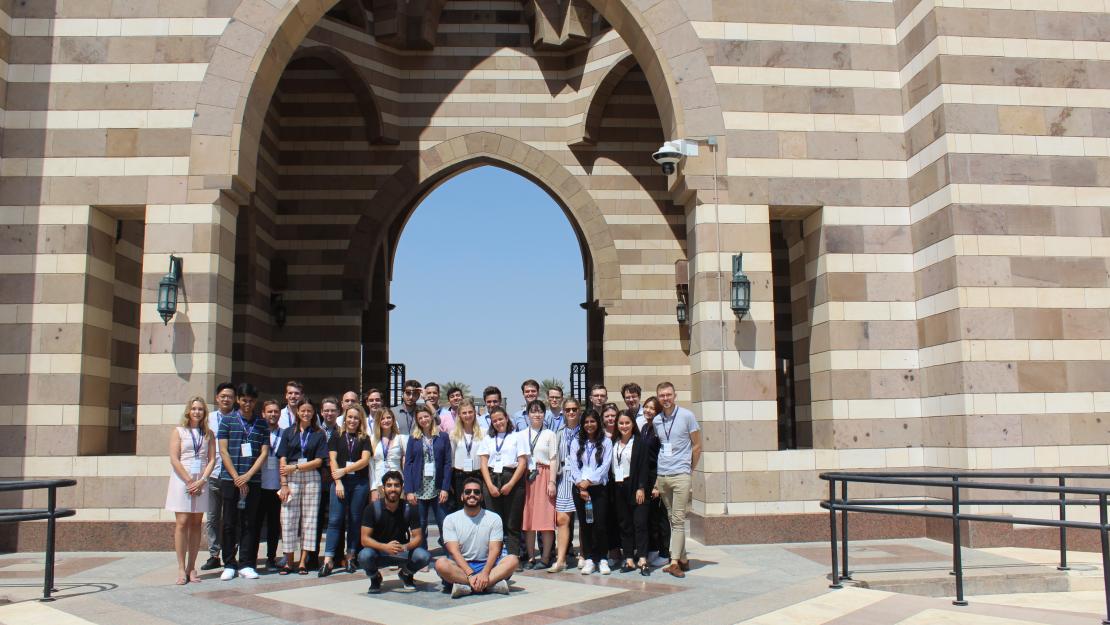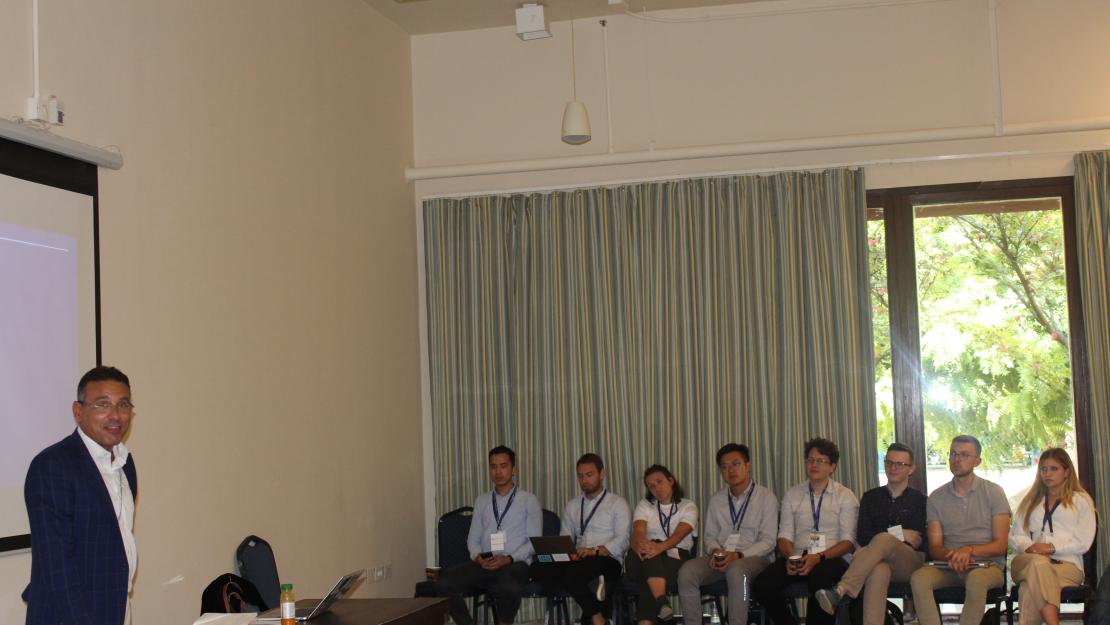Attend the Digital Education Campus Conversation on October 9 in Moataz Al Alfi Hall, AUC New Cairo to learn more about the innovative initiative.
According to Forbes, the worldwide e-learning market is projected to be worth $325 Billion in 2025. In its second century, AUC will be more focusing on its potential to innovate via empowering learners through digital education as the first university to have a robust information technology infrastructure and a Center for Learning and Teaching infrastructure. The News@AUC team spoke with Hoda Mostafa, director of AUC's Center for Learning and Teaching about digitizing education at AUC.
Can you tell us more about the Digital Education at AUC?
Digital education, in the broad sense, is not new to AUC. We have always strived to lead the transformation of higher education through digital education and innovative pedagogies for many years. It started in the early 2000s, before we moved to AUC New Cairo, with the adoption of a learning management system across the University and the adoption of multiple instructional technologies across the board, whether it is web 2.0 or specific instructional technologies in the classroom, platforms that students use across the disciplines. We offer strong support through the Center for Learning and Teaching (CLT) around the active integration of technology into the classroom in what we call “pedagogically sound” ways. In other words, we do not encourage the integration of technology for its own sake, but because it improves the educational and the learning experience for our students, and it is also a learning opportunity for our faculty.
What is the more recent Digital Education Initiative all about?
It is a University-wide initiative around digital education to include online, blended learning as part of our innovation pillar at AUC. Online and blended programs are being introduced to provide greater access to our extended education offerings within our programs and diplomas. This modality allows learners from anywhere around the globe to take our courses. For example, by offering courses fully online in Arabic, we are expanding our reach and appealing to the Middle East and North Africa region and other audiences. For undergraduates, we have started offering Arabic courses in a blended format this semester.
In 2013, President Anderson established a Task Force on Blended learning with the mandate, "To develop guidelines and best practices for an institutional implementation of blended learning at AUC and to assess AUC’s readiness for such an initiative”
In 2014, the AUC provost established a standing committee on Blended and Online instruction that was made to set or recommend policy and strategy at the University level for blended and online instruction.
It is only in the latest strategic plan of the University that blended and online learning became a specific strategic goal.
What are your biggest challenges?
Faculty require support to design and teach in an online or blended learning modality. We already have experience with faculty who have taught courses in a blended format, which means that part of the class time is replaced with an online experience so they are doing some things online and some things face-to-face, and the course is designed so that it flows naturally. Teaching online is not the same as teaching face to face. This is a challenge when introducing these new mindsets to the learning landscape at AUC. Students also need support to succeed as online learners.
How are you working to overcome those challenges?
We are working on training faculty on how to design blended-learning courses, whether they're degree or non-degree programs, so we are building up capacity for our faculty to become more familiar with designing courses. We are also training instructors to teach online because it is very different than teaching in the classroom.
It is important to understand that in any initiative like this, there is always slow incremental gradual change, changing the culture, and establishing strong roots and capacity building. Expecting faculty to teach online or even to teach with technology requires capacity building and professional development and that’s why we are very lucky that we have a CLT at the University that can support faculty to explore new ways of teaching with the support of an infrastructure that allows this; whether it is a technological infrastructure like a robust institutional learning management system or the support system of skilled instructional designers and instructional technologists at CLT, which is unique in the region.
Who will benefit from this initiative?
The digital education would benefit the entire community of educators and learners and learners beyond AUC students.
In the few courses that have recently been launched, we have had over 900 students who took non-degree courses in the area of extended education.
How is it different from blended learning? And from what AUC currently offers online?
Blended learning is part of the initiative, but the scope of the initiative now is to go fully online with a focus on the professional non-degree area, not just AUC students. Through the School of Continuing Education, we have just launched one diploma, “Foundations of Business Administration” as a pilot.
The establishment of the digital education unit at the Center for Learning and Teaching is what makes it different. Now we have a unit and a whole team; an instructional technology team, instructional development, and video production and multimedia team. The teams are composed of nine exclusively dedicated members to support faculty in everything related to digital education, whether it is the traditional or not so traditional integration of technology into the classroom, video conferencing, the production of videos in our state-of-the-art studio or the design of blended and online courses with the full support of the instructional design and technology team.
Why is this an important initiative for AUC?
We are the first university to have a robust information technology infrastructure and a Center for Learning and Teaching infrastructure.
I think it is important to think of a common purpose for higher education, and that is the transformative nature of higher education including the experiences that the students are exposed to, types of skills they learn, self-learning, interacting with people online and digital literacies. All of these things are implicit to learning in a blended or online environment. Additionally, online courses contribute to increasing AUC’s reach to people who can benefit from quality AUC courses.
But it is a slow process. That’s why we have a one, two and three-year plans, but the overarching of why it is important to AUC is because it affects everyone, technology is part of our lives, every single person should be able to teach himself new things even if learning how to cook or play the guitar through a YouTube video. We should embrace that we can offer high-quality online experiences that are equal to our face-to-face quality of education.
What are your short and long-term plans?
Our hope is to introduce some elements of a blended or online learning experience for our students and expand our reach. If you look at some of the statistics in the U.S, you'll find that over 30 percent of the students will have taken at least one online course in their undergraduate education by the time they graduate and this is increasing every year. There are multiple public and private universities that offer the same course in both versions; online and face-to-face and the students can choose.
The strategic mission of the University in the next two years is to focus on the non-degree professional certificates, diplomas and tracks through its different schools so any kind of professional offerings in extended education is a strategic kind of area for growth. This doesn’t mean we won’t be looking at opportunities in the post-graduate offerings at AUC as well.
How can people apply or learn more about it?
Through CLT as mediators of the process. The schools and their programs are identifying the programs that have the potential to go online, they are doing market research and addressing their audience, building on their knowledge of their learners and program placement. It is a school-driven initiative according to the needs of their community of learners. CLT serves as a service and support center and not necessarily a decision-making entity. We serve the schools with the purpose of bringing together all stakeholders; chairs, program directors, deans, faculty to the same kind of space.
How will the stakeholders benefit from the Digital Education Campus Conversation taking place on October 9?
On October 9, we are holding a communication event followed by an opportunity-seeking activity, bringing together the stakeholders, asking common questions like where do you see the potential of online learning within your community of learners. The community of the School of Continuing Education is very different than the executive business community and the Kamal Adham Center for Television and Digital Journalism learners and we should respect the differences so that our products align with the market needs.
In this community campus conversation, stakeholders will hopefully meet to explore opportunities at CLT and leave with a better understanding of their needs and the transformative power of integrating digital education, whether online, blended or web-enhanced learning into their programs.

































